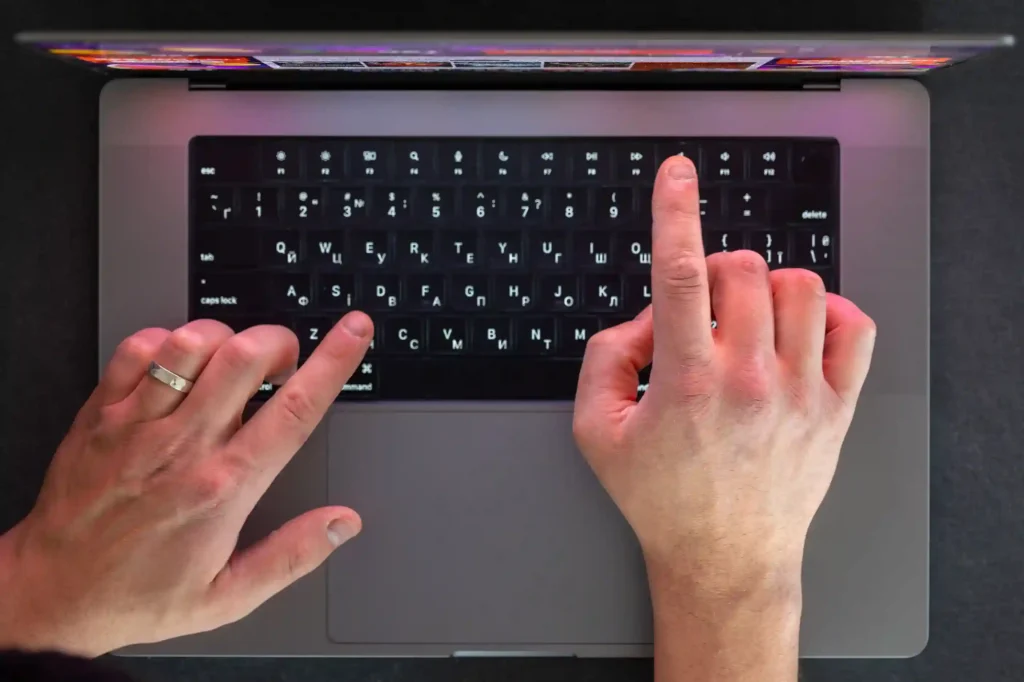Choosing the ideal mechanical keyboard for your workspace involves a crucial decision between quiet and loud types, each offering distinct advantages and disadvantages for your professional environment.
The sound your fingers make reflects different styles that suit various environments and personalities – in the world of touch typing, where you use all fingers without looking at keys, both approaches have their place. This method helps you type faster with fewer errors and becomes more interactive with practice, as the real power lies in how it reduces costly typos.
Quiet Typing – A Peaceful and Smart Typing Choice
When we talk about typing, people often forget how much noise it can make—especially in a busy office, a quiet library, or a shared space. That’s where quiet typing becomes a helpful and smart solution.
I used to use a loud mechanical keyboard, and it really distracted people around me. Some even looked annoyed by the constant key tapping. So, I switched to a quiet mechanical keyboard, and it changed everything. These types of keyboards are made to reduce noise, but still give you a good typing feel.
What makes this type of keyboard special is the use of specific switches, like the Holy Panda switch, and rubber dampers. These switches are designed to minimize the noise generated while typing, while still giving you the nice tactile feeling when you press the keys. This helps keep your typing style smooth and soft.
Some typists enjoy working under the radar, and quiet typing makes that possible. You can secretly type at speed, and your colleagues or even your boss won’t even notice. It’s a good thing for those who like working in peace without grabbing too much attention.
Shy typists especially benefit from this. When you press keys gently, nobody can hear you. This takes away the pressure of being heard. It also helps reduce self-consciousness, which can sometimes hurt your accuracy or slow your typing speed. When I switched to quiet typing, I felt less nervous and made fewer mistakes.
This style also creates a calm atmosphere, which helps with focus and can even reduce anxiety. If you’re someone who likes quiet environments, this is an ideal method. It supports productivity by removing noisy distractions and letting you work without being disturbed.
Advantages of Quiet Typing
- Helps avoid noise in shared spaces like offices and libraries
- Allows typists to type secretly without attracting attention
- Great for shy typists who feel pressure when others hear their typing
- Reduces anxiety, self-consciousness, and helps improve accuracy
- Creates a calm atmosphere and improves focus
- Makes working more peaceful and less distracting
- Uses quiet mechanical keyboards with switches that offer tactile feeling
- Good for people who prefer quiet environments
- Popular switch models like the Holy Panda switch balance sound and feel
- Improves typing speed and comfort in the long run
Disadvantages of Quiet Typing
- Quiet mechanical keyboards offer less pronounced tactile feedback
- May be difficult to determine if a key is pressed correctly
- Fewer switch choices compared to noisy keyboards
- This limitation can affect customization for individual preferences
- Often more expensive because of advanced design to lower sound
- Some typists miss the strong feedback from traditional mechanical models

Noisy Typing
While quiet typing is soft and calm, the flip side is called noisy typing. It’s louder, full of energy, and some people actually love it. I still remember the extremely loud typewriters from back in the day. That clickety-clack made it feel like real work was being done.
Today’s noisy mechanical keyboards bring back that same strong feeling. They are built to make a noticeable sound and provide tactile and audible feedback. The special switches in these keyboards give a robust typing feel and a clear reaction when a key is pressed. You don’t just hear it—you feel it in your fingers.
Some people even use software like Mechvibes on Windows, macOS, or Linux to add that same sound, even if their keyboard doesn’t make noise. That may sound unusual, but many enjoy the strong auditory feedback it creates.
Also, the louder the typing, the faster it sounds. That sound becomes a signal—“I’m working!” And for some, it gives the feeling of actually getting work done.
Advantages of Noisy Typing
- Noisy typing can show others that you are busy and not just sitting around.
- The sound of typing may help some people feel more active and focused.
- Many people enjoy the sound of keys, and it can feel satisfying and energizing.
- The louder sound can create a feeling that you are actually getting work done.
- Mechanical keyboards often provide tactile and audible feedback, which some users love.
- The clear click of each key press helps you know that the keystroke worked.
- This auditory feedback can help reduce typing errors by confirming each action.
- People who like a strong typing experience may prefer the robust typing feel these keyboards give.
- Some switches inside the keyboard are designed to give more resistance, adding to the tactile experience.
- Tools like Mechvibes allow users to simulate keypress sounds on Windows, macOS, and Linux for fun or practice.
Disadvantages of Noisy Typing
- The noise produced by each keystroke can be annoying to people nearby.
- In a shared space, the constant key sounds may be a big distraction.
- It may disrupt the working environment and make it hard for others to concentrate.
- Excessive noise can lead to mental fatigue, especially during long work sessions.
- Some people may feel stressed or lose focus because of the loud keyboard sounds.
- This kind of typing is usually not suitable for quiet places like libraries or team offices.
- Negative repercussions may occur if the sound bothers coworkers or affects team productivity.
- A noisy work environment may not be conducive to concentration or calm thinking.
What Type of Keyboard Suits Your Working Style?
Choosing the right keyboard really depends on the environment and what kind of workspaces you’re in. From my own professional experience, in offices where people work closely together, a quiet, even silent, option is highly recommended. It helps maintain an optimal level of discretion, reducing noise and distractions for your colleagues.
Especially in open-plan or collaborative spaces where effective communication and concentration are key, a quiet keyboard helps promote tranquility and respect among team members. The Rhizome Lite Mechanical Keyboard is a great choice for such settings — it’s equipped with latest generation tactile switches that give a unique typing experience with acoustic comfort, and its minimalist, clean, and elegant design fits right in.
However, in noisy or busy workspaces — like reception areas or environments already requiring constant interaction — a mechanical keyboard that gives pronounced auditory feedback can be more suitable. These keyboards blend seamlessly into noisier environments, making the sounds generated by typing less of an issue.
In fact, they can even help some individuals focus better by giving clear physical and sound cues. The choice really should depend on the context and each person’s own preferences, especially in terms of how the keys feel and sound when used. A good balance between sound and functionality can make all the difference in creating a conducive space for both collaboration and productivity.
Conclusion
In the end, whether you prefer quiet or noisy typing really depends on your work environment and personal preferences. A quiet keyboard is ideal for offices, collaborative spaces, or workspaces that require concentration and discretion. On the other hand, a noisy, mechanical keyboard might suit individuals who like pronounced auditory feedback while typing.
Both options have their strengths, and choosing the right one can help you maintain productivity and comfort. It’s about finding the right balance for your setting. Always consider your surroundings and how your keyboard might impact others. Making the right choice can create a more conducive and respectful work atmosphere.


